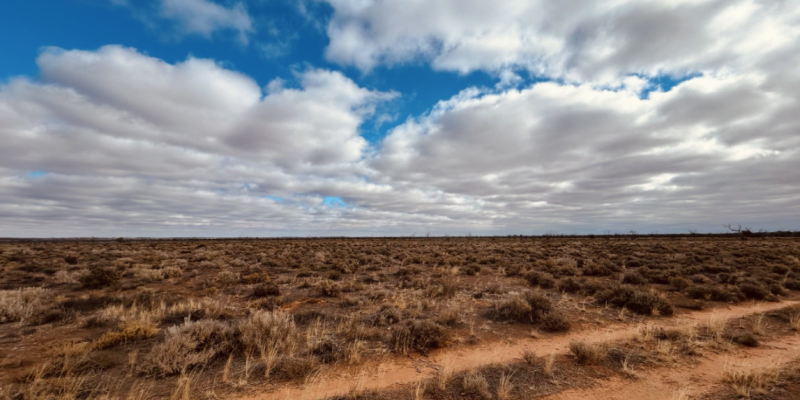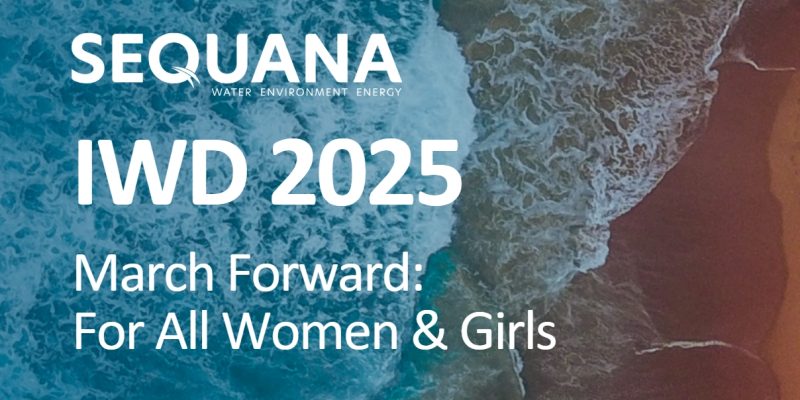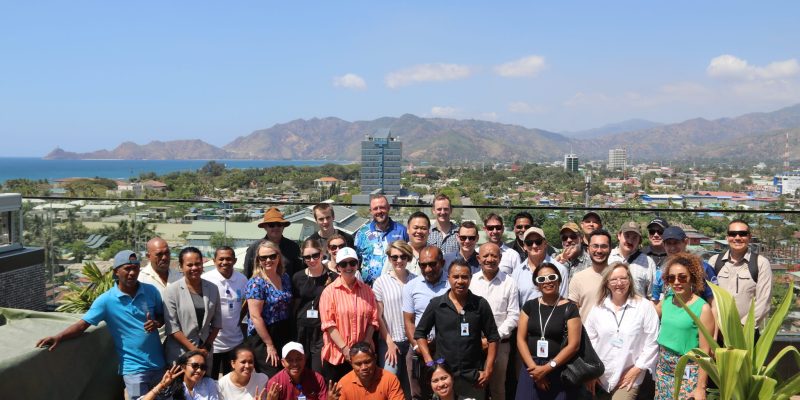
As we reach day four of our International Women’s Day campaign, we continue to share the perspectives and insights of some of the incredible women who are shaping the water industry for the future.
Our Project Manager, Kirrily Addison points out that education on gendered bias with our male peers still needs to evolve and be challenged whether it is in or outside the workspace. Janice Wilson, Managing Director & Principal Engineer at Double Black Diamond Solutions highlights that pay equity is still a recurrent issue in any industry, while our Senior Project Manager, Jess McGrouther wants to shift the narrative and challenge the status quo.
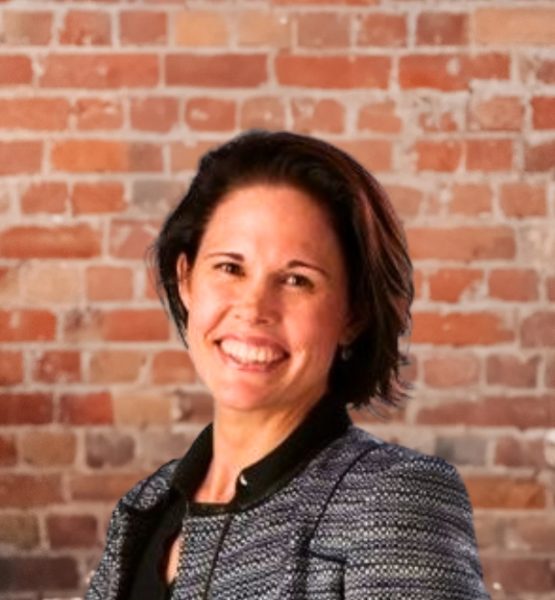 Kirrily Addison, Project Manager, Sequana
Kirrily Addison, Project Manager, Sequana
What does “March Forward: For ALL Women and Girls” mean to you? How do you think we need to march forward to unlock equal rights, power and opportunities for all and a feminist future where no one is left behind?
We can continue to promote awareness among the men we work with, live with, and who are otherwise in our lives of outdated attitudes and behaviours towards women, and the challenges that women constantly face. Most men would say they support women and their pursuits, but often we hear men say they have been unaware of gendered bias they may have or that is commonly exhibited in the workplace – until someone points it out to them. Lack of awareness inhibits effective change and the unlocking of equal rights and opportunities. If we have a curiosity about tuning into our behaviours or attitudes, and an awareness about how women are treated, hopefully, it will lead to positive changes.
How can we empower the next generation to be catalysts for lasting change?
Encouraging people to be aware of gender dynamics and calling it out (respectfully) – in the office, in meetings, and even in our lives away from work. Making it clear to the next generation that this kind of behaviour or these attitudes are becoming more and more noticeable, and that attention can be brought to it and that it can be changed.
In our industry, how do we close the gap to achieve gender equality?
Awareness is the first step – asking people to observe what’s happening around them. What is the gender mix in the office, or meetings? Are both men and women included in discussions or casual conversations? Is it men who are speaking most of the time? Does the environment invite or inhibit women’s contribution and participation? What is the body language in the room? Whose input hasn’t been invited? Who is being ignored? Who is being interrupted? Are the females at work expected to prepare refreshments for meetings and then clean up afterwards? Are the females expected to take minutes in meetings? Is it left to women to clean up the lunchroom? Do women get talked over or interrupted? Is there an unconscious bias towards men when considering job applicants? Are sexist words and phrases used? This isn’t specific to our industry, but we certainly work in a traditionally male-dominated field.
What are some of your own experiences in the industry?
I have been very lucky in my career, and I do not feel like I’ve suffered significant setbacks or strong discrimination for being a female. However, I have faced challenges – working in site offices with inappropriate calendars and posters on the walls, consistently being called ‘sweetheart’, facing unwanted advances from an executive level manager (and no support from my manager when raised with them). Most of the people I’ve worked with have been very supportive and even protective of me and other females. While working at Sequana I’ve probably been working with more females than previously.
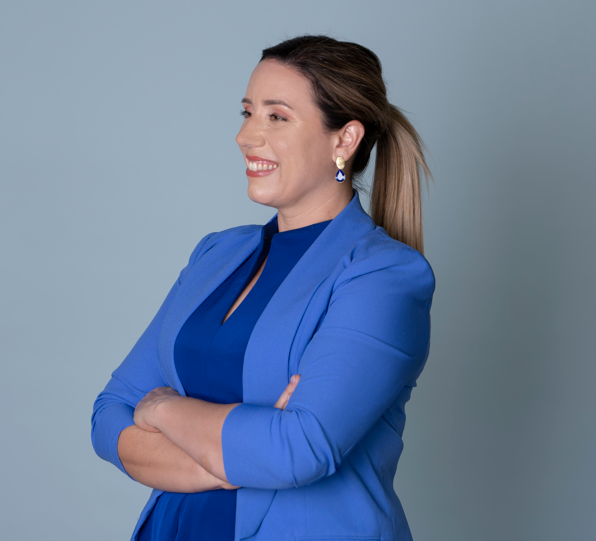 Janice Wilson, Managing Director & Principal Engineer at Double Black Diamond Solutions, Non-Executive Independent Director at Mount Isa Water Board, Independent Member, Wide Bay Water and Waste Advisory Committee, Fraser Coast Regional Council, and Executive Officer at Greater Whitsunday Council of Mayors (GWCoM)
Janice Wilson, Managing Director & Principal Engineer at Double Black Diamond Solutions, Non-Executive Independent Director at Mount Isa Water Board, Independent Member, Wide Bay Water and Waste Advisory Committee, Fraser Coast Regional Council, and Executive Officer at Greater Whitsunday Council of Mayors (GWCoM)
What does “March Forward: For ALL Women and Girls” mean to you? How do you think we need to march forward to unlock equal rights, power and opportunities for all and a feminist future where no one is left behind?
Pay equity is a serious issue – the Workplace Gender Equality Agency estimates that female professionals in engineering design and engineering consulting services have an average total remuneration gap of 22.9%. Anyone in a leadership or executive position, regardless of gender, can review their direct reports’ salaries to identify and address pay gaps. This is just one thing that will help to attract and retain female talent in the industry.
What are some of your own experiences in the industry?
I’ve been so lucky to connect with other professionals and working parents who have blazed the trail on the work-life balance front. They are like my informal Board of Directors for being a business owner, director and working parent and I regularly reach out to them for advice and reassurance. The most valuable takeaway from these amazing mentors is that the key to juggling all of the things we are responsible for is to understand which ball is made of plastic and which ball is made of glass. If you drop a plastic ball, it bounces – no harm done. If you drop a glass ball, it shatters, so you need to prioritise the glass ones. The takeaway is not to prioritise kids over work, or work over kids – just understand that some kid stuff is plastic, and some is glass. It’s OK to drop a plastic ball if you need to catch a glass ball – be kind to yourself.
Learn more about Janice here.
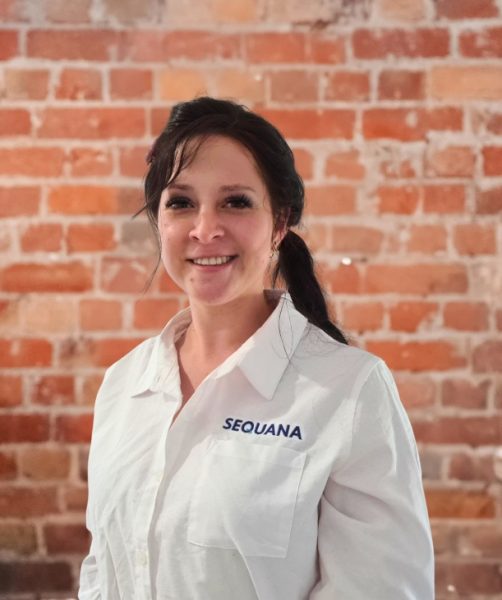 Jess McGrouther, Senior Project Manager
Jess McGrouther, Senior Project Manager
What does “March Forward: For ALL Women and Girls” mean to you? How do you think we need to march forward to unlock equal rights, power and opportunities for all and a feminist future where no one is left behind
I believe we’re heading in the right direction in several key areas, with one major factor being the increase in flexible working hours since COVID. Without that flexibility, I’m confident many women, me included, wouldn’t be able to return to work after having children and maintain as many working days as we do. For those of us career go-getters, this is important to allow us to still feel as though we are moving forward and not battling what feels like a stagnant period in our career while we choose family over work. There are still areas that need attention, such as normalising job share arrangements to ensure women can take on senior roles with real accountability; something I haven’t seen successfully implemented in my workstream. But flexibility is just one piece of the puzzle. It’s widely recognised that women often carry the mental load or take on the role of “life administrator”, which can feel like an overwhelming burden at times. This mental energy could be better spent advancing our careers, but it’s frequently diverted elsewhere; something men typically don’t have to manage to the same degree. To achieve true equality and unlock opportunities for aspiring women, society needs to shift how we approach life as a whole, requiring a balance in all elements of both the workplace and personal life.
How can we empower the next generation to be catalysts for lasting change?
We need to walk the talk! Let’s do all the things that we want to see happening. Marian Wright Edelman says “You can’t be what you can’t see” – maybe for some, this isn’t true, but for me, it has certainly been, and I’ve been making it my mission to do all the things I can’t see women doing to help pay it forward for the next lot of female powerhouses.
In our industry, how do we close the gap to achieve gender equality?
From what I have seen, my thoughts on our industry are that we are doing a pretty good job of keeping our fingers on the pulse of where we need to tackle challenges to make lasting change. We need to keep challenging the narrative and the status quo. Instead of asking “Why?”, we need to ask, “Why not?”.
What are some of your own experiences in the industry?
It’s easy to feel that perhaps I received an opportunity to start my career as an engineer due to my being a female in the male-dominated construction industry, because of the drive for diversity in this field. The graduate position I received as one of two grad hires (both female) was from a pool of 200. Did I get the call up because I am female? Maybe, but what I know is that I rocked that interview, so if it was an opportunity or not, I felt that I deserved to be there.
I’ve had many opportunities that my male counterparts perhaps haven’t, such as attending events like those around International Women’s Day, NAWIC (National Association of Women in Construction), and participating in various leadership summits. However, the further I progress in my career, the more I realise that for women these opportunities are not just beneficial, they’re necessary. Networking with other women, sharing strategies, and discussing challenges that our male counterparts may not be facing is crucial for recognising that our struggles aren’t unique to us alone. They’re likely shared by others in similar roles, though we may not always see it since there may be fewer of us in these positions. So, while these opportunities are valuable and perhaps give us a leg up, they’re also essential in terms of strategising as to how things can be done more inclusively.
My biggest challenge has been witnessing a lack of senior females in roles that I aspire to be in. It has begged questions in my mind as to how I will one day get there myself, especially with competing priorities around wanting to raise my young family. I have not seen many senior women working part-time in a similar role to myself while juggling young kids, and it has made it very difficult for me to see that I can get there myself. This is probably the driving force behind my earlier response around putting myself in those positions for other young women to grasp so that they feel that one day they can see themselves doing similar things.
Working for Sequana has been a welcome shift for me. I joined Sequana from the construction world, looking for a role with more flexibility, empowerment, and career growth opportunities. That’s what I got! I have had the opportunity to partake in projects that have tested my limits personally and professionally, but it has always been left up to me as to what I am willing to take on and how I can design that role to make it work for myself. The questions that have been asked such as “What would you like to do?”, “How do you need to arrange your time to make this work?” and “What support do you need?” have been game-changers and made me feel like anything is possible. As a part-time working mum trying to juggle a million things inside and outside of work, being asked what I can handle, rather than having someone else decide what I can’t do, has opened many doors.
